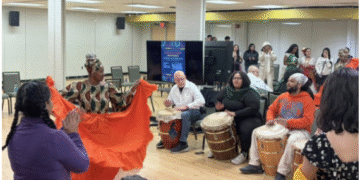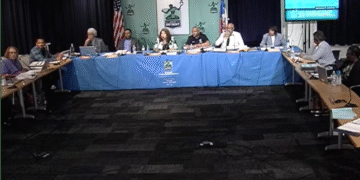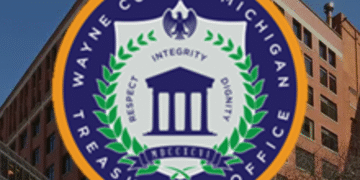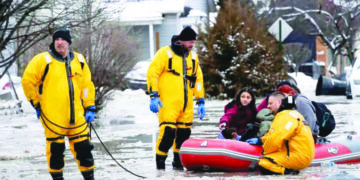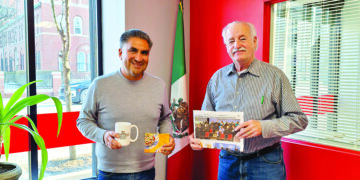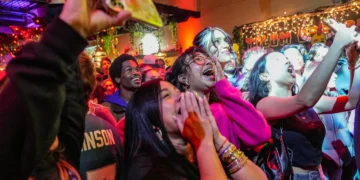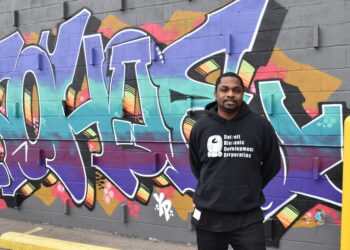EL CENTRAL Hispanic News was the only Hispanic-owned media outlet in Southeast Michigan to accept an invitation to meet with Governor Gretchen Whitmer and Lt. Governor Garlin Gilchrist when they made a recent visit to Detroit. The interview was conducted by EL CENTRAL freelance writer Andrea Meza who is a graduate of Wayne State University in broadcast journalism. Photo credit to Alejandro Ugalde. Highlights of the interview follow.
EL CENTRAL: Thank you for being here, governor. Lieutenant Governor, to give a chance for our readers at EL CENTRAL to learn about what you guys have been doing so far this year. First question I have here is about the Growing Michigan Together Council released some changes last week or improvements that stated educational improvements and opportunities. What recommendations do you believe are going to most impact our Latino residents here in Michigan? And also, there were no specifics to funding those initiatives. So how do you plan on funding those initiatives?
Gov. Gretchen Whitmer: So first, let me just say, I think that it’s important for us as Michiganders to recognize that our population has been stagnant for a long time, decades, and we’re not going to address this overnight. But as governor, I know that this is such important work and I wanted to get it started with these leaders with different expertise and political philosophies and disciplines to come together and go through the data and make some recommendations. In these recommendations, there are actions that the state should take. There are actions at the local level, some at the federal level, some in philanthropy and in the private sector as well. Think that this is an opportunity for us to really look at what we are doing and what we could or should consider doing more of. Let’s just talk about education real quick. Five years in a row, we have delivered the biggest investment in education in Michigan history. We leveled out how much per pupil we allot for each child in Michigan. And then we built equity on top of that by putting a lot more money into English language learners, kids who are at risk, and kids with special needs.
This is how we built equity in. Now 1.4 million Michigan kids get free breakfast and lunch at school because we wanted to destigmatize the act of getting a free meal. These are all important aspects to of know the Latinx community here in Michigan, but also, I think, to the health and welfare of our economy, that we’ve got to meet the needs of our people and make sure that Michigan continues to be a welcoming state, a state that people move to for opportunity, whether they’re moving from a state down South or from a country elsewhere. We want people to come to Michigan because this is where they will get protection and respect under the law and real opportunity for prosperity.
EL CENTRAL: And so (building) off of that, about, the population. There has been a rise in the population of Latino communities, as well as a rise in their engagement and their political influence. How do you hope to increase engagement at the local and state level?
Gov. Whitmer: I’m really grateful that we’ve got such a robust Latin community, a Latinx community. It’s been something that I think is a really important part of our economy and our future. To make sure that Michigan is a place that we attract people and talent to, I appointed Poppy Hernandez, who is the head of Global Michigan. She is promoting, I think, policies that really make Michigan welcoming. And from her heritage and her point of view, I think that she’s the perfect person to really stake out what policies we need here in Michigan to ensure that this beautiful community continues to grow. (To Lt. Gov. Gilchrist) Anything you want to add?
Lt. Governor Garlin Gilchrist II:
You know, we’re seeing the Latino community grow in different parts of the state of Michigan and do so very quickly. And I think that’s a good sign. It’s showing that the work we’re doing with our local partners is making more communities in Michigan feel welcoming. And the truth is, if you can see a pathway for your kids to get a great education, you can see a pathway to get a great job in a field or an industry that you care about and that you’re trained in, and you can see just a future for your family. That’s where you’re going to want to be. And we want that to be true in every corner of Michigan, that the totality of our state is available to the Latino community to be able to thrive and to grow. And so certainly what comes with that then, is increasing participation and decision making processes at every level. And we care about everyone’s input and perspective. That’s why the governor and I have worked so hard to implement the will of the voters of Michigan who wanted to make voting more accessible to more people, to make sure you could cast a vote with confidence, have it counted with confidence, and making sure that there are no barriers that stand between you and your rights.
EL CENTAL: And so some of our readers have expressed some frustrations with not having a Hispanic appointed judge yet. Is that a plan for the future?
Lt. Gov. Gilchrist: Yeah, absolutely. I think that one of the things that we’ve been able to do is have the most diverse cabinet in the state’s history. We’ve made great strides on commissions and agencies and boards, but I’m always looking for great candidates as I think about the bench. And so I want to invite anyone who would like to apply and to be considered for upcoming vacancies and opportunities. Like I said, the first thing is getting your name in the mix. So I want to invite any of your listeners and viewers to submit theirs.
EL CENTRAL: You’ve recently signed the Statewide Meaningful Language Access Coordination act, which is about requiring state departments and agencies to take reasonable steps for helping the limited English residents. Aside from funding and support from the Office of Global Michigan to track the implementation by state agencies, is funding available for nonprofit providers who are the first source (of support for) limited English residents from Michigan?
Gov. Whitmer: That’s a good question. I don’t know off the top of my head, but certainly happy to circle back with you.
EL CENTRAL: Okay, let me jump down (to a question for the Lt. Governor). So you are an inspiring leader. You’re a Detroit native, raising your family here in Detroit. What changes do you see in the administration that will greatly impact Detroit natives and create a generational wealth here in Detroit?
Lt. Gov. Gilchrist: Well, I think the first path toward building health and wellness is going to start with education and being healthy. Our administration has worked with local partners to make sure everyone has better access to healthcare in the city of Detroit and in the state of Michigan. The work that we did during the COVID-19 pandemic to close racial disparities, whether it was with the Black community or the Latino community, in terms of how people were impacted by COVID-19 has resulted in more health resources being available to more people. That means you can now be healthier as your family grows and prospers. My kids go to Detroit public schools. There’s more money being invested in Detroit public schools than ever in the history of the state of Michigan. And that means better supported education professionals, (and) a wider array of education resources and programming available to kids across the city of Detroit. And as Detroit grows, so does Michigan. When folks are successful in Detroit, it’s good for the state of Michigan. And so I’m proud to continue the progress on all of those efforts. And I know that it’s going to make a big difference for our families in this part of Michigan and for the rest of the state.
Happy holidays. Happy holidays. ¡Feliz Navidad!
EL CENTRAL:
Thank you both again.
This interview was made possible by the Race and Justice Reporting Initiative. The goal of the Initiative is to strengthen representative democracy by building trust between the news media and Black, Indigenous and Peoples of Color (BIPOC) communities.



